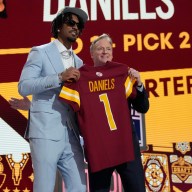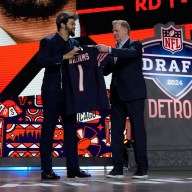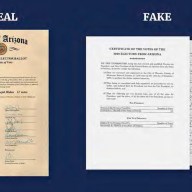What would summer be without a Danielle Steel book? Since 1981, her works have been a near-permanent fixture on the New York Times hardcover and paperback best-seller lists, selling over 800 million copies. Out today is this summer’s tome, “Happy Birthday,” which weaves the stories of three characters who must come to terms with aging. Now 63, Steel talks to Metro about what keeps her ticking.
Forbes recently named you the world’s second-most powerful female writer, after J.K. Rowling and ahead of Nobel Prize-winner Toni Morrison. Is it an honor, or are women-only lists an insult?
I am honored to be on any list, female or mixed-gender, that lists me as the second-most powerful female writer or the best anything. I’m grateful for the respect for my work, whether it is from women or men and women. It would seem foolish to me to be “insulted” by praise. And coming “ahead” of a Nobel Prize winner is pretty impressive.
One of “Happy Birthday”’s main characters, April, is a successful businesswoman, but is about to turn 30 and has neither a husband nor children, which depresses her. Is this such a terrible thing for a woman of 30?
I don’t think it’s terrible at all to have no husband or children at 30 or any other age. Today, people make choices based on what they want. Women who don’t want children don’t have them, instead of feeling obliged to as they did in the past. And if they don’t want children, they shouldn’t have them. And conversely, women who do want children but don’t have a husband seem to work that out today, too. Life today is about having far more choices than we ever did before. The social norms have changed, which gives me lots to write about.
What does one of the world’s most popular authors read in her downtime?
I don’t want to read overly serious or depressing works that require a lot of concentration. Personally, I enjoy reading novels, and religious books to inspire me and give me a sense of peace. I want to read something that I enjoy, which I think is why people read my books as well. My characters are believable, and the situations we all live through, the challenges we face — but I try to address those issues in a hopeful way. As a result, people don’t feel so alone when they read my books.
Your books have sold upward of 800 million copies, but literary types look down at authors like you. What’s your reaction?
I’m not offended by “literary types” looking down their nose at commercially successful, “popular” authors. That has always been the case. The literary world looked down at Charles Dickens and said the same about him. History has proven otherwise. I don’t know if there is jealousy involved — or literary ideals. I write what people care about and experience, that seems to work for me, and for my readers, 800 million of them. That works for me.
















